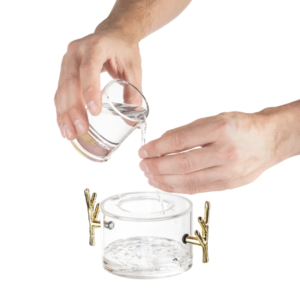
By Rabbi Avraham Chaim Bloomenstiel
Q: Why do most Ashkenazi women not wash mayim acharonim? Does it have anything to do with tznius?
A: The short answer is that it has nothing to do with tznius.
Now for the long answer:
There are two reasons for mayim acharonim (washing the fingers after the meal). The first is that it was a Talmudic-era health measure promulgated due to melach sdomis, a condiment that could be harmful if it got into the eyes (imagine accidentally rubbing Tabasco into your eye after a meal – ouch!). See Chulin 105b.
The second reason is because one should have clean hands when blessing G-d. See Brachos 53b.
At some point in the past, everyone agreed that washing mayim acharonim after a meal was an absolute obligation. But, time marches on, and changes in social and historical circumstances have given rise to different approaches to mayim acharonim in our times. The Shulchan Aruch, Orach Chaim 181:1 writes that although mayim acharonim is an obligation, many today are not concerned for it. In other words: some people hold it is an obligation today, and some people don’t.
There are three views on this in the later poskim:
1) Mayim achonim is not an obligation because the Talmudic reasons are no longer relevant. According to the Mishnah Berurah 181:22, many hold that melach sdomis no longer exists. That dispenses with the first reason for mayim acharonim. The Mor UKetzia (Rabbi Yaakov Emden, 1700’s—one of the leading poskim of his era) adds that the second reason does not apply today either. In Talmudic times, people ate with their fingers. Today, everyone uses utensils and our hands stay extremely clean when eating. He adds to this that women are more careful than men to avoid touching their food. Rabbi Emden posits that, on account of these reasons, women have even less of a reason to wash mayim acharonim.
2) Even though the Talmudic reasons no longer apply, there are kabbalistic reasons to be strict and wash mayim acharonim. The Mogen Avraham (Rabbi Avraham Abele Gombiner, 1600’s—one of the fundamental commentaries on the Shulchan Aruch) writes that we should be strict to wash mayim acharonim even if the original reasons are no longer relevant. He writes that there are kabbalistic reasons for being strict to always wash mayim acharonim. Most poskim agree with the Mogen Avraham. According to these authorities, mayim acharonim today is a stringency based on kabbalah. The Shevet HaLevi (Rabbi Shmuel HaLevi Wozner, d. 2015), one of the great poskim of the last generation, writes that Ashkenazi women just never adopted this stringency (perhaps because of the reasons mentioned above from the Mor UKetzia). Also, many poskim point out that women do not practice stringencies based on kabbala. This is the main reason that Ashkenazi women are not strict about mayim acharonim.
3) According to some poskim (i.e. Rabbis Yosef Chaim Zonnenfeld, Shlomo Zalman Auerbach, and Yosef Shalom Elyashiv) one or both of the Talmudic reasons are still relevant today. These poskim hold that women must wash mayim acharonim at the meal right along with the men.
So – according to those who hold that mayim acharonim is only a stringency today, it is not relevant to nor was it ever adopted by women. According to those who hold that mayim acharonim is an obligation, then women should wash at the table along with the men.
There is no one who says that the reason has anything to do with tznius.
